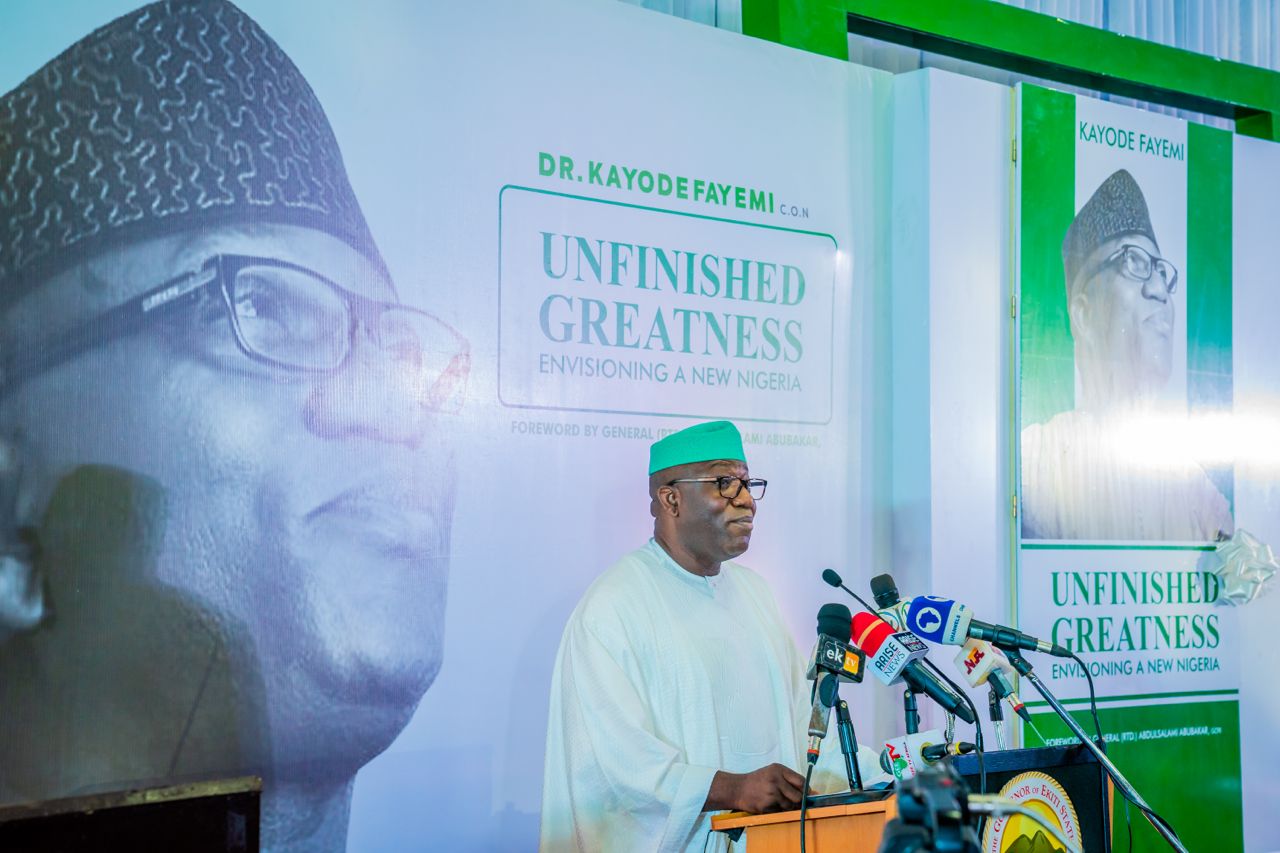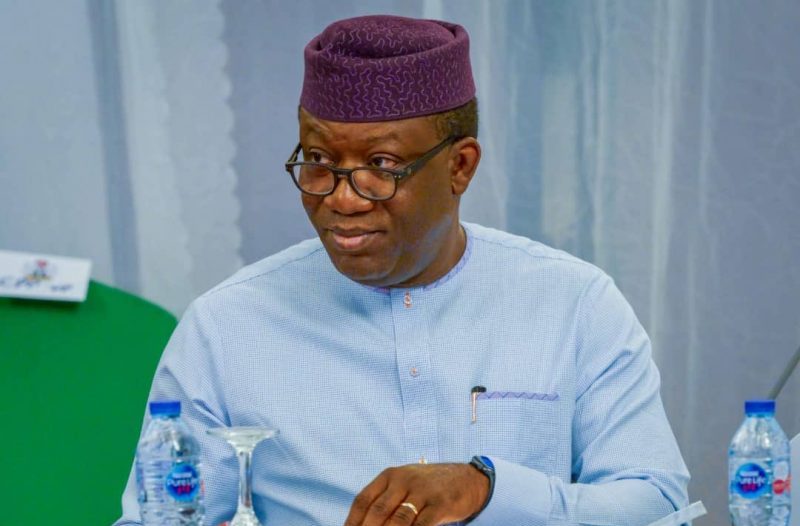Opinions
Fayemi: Celebrating A Soldier Of Peace At 56 By Yinka Oyebode
Today, it is 56 hearty cheers to this reliable mediator, soldier of peace and a change agent as he takes the fifty-sixth step in the quest for a more peaceful and developed society.
In one of his most recent interviews with a national daily, Governor Kayode Fayemi was asked to state for the record, who between former Lagos State Governor, Asiwaju Bola Ahmed Tinubu and former Governor of Ekiti State, Otunba Niyi Adebayo brought him into partisan politics. The intention of the reporter was two-fold: First, to further the debate on the topic, which had been generating interest on social media for about a month. Second, to get a fresh angle to the story, exclusively for his newspaper. The question was neatly wrapped as a follow up question and should naturally provide him the opportunity to go full blast- to give credit to one above the other.
But Governor Fayemi calmly threw the question back at the reporter: “What does it matter who brought me into partisan politics?” adding, “The point is that I am in partisan politics. I benefitted from the tutelage of both elders that you mentioned.” He stated further that he had the privilege of working with both leaders and other leaders at different times and levels on development projects, emphasising, however, that both have been quite supportive of his rise to political prominence. “And I owe them a lot for bringing me into the partisan political space,” he said.
That calm answer did a lot to calm down the reporter who realised that a screaming headline he had envisaged was no longer possible.

That is quintessential Kayode Fayemi, a man who holds a doctorate in War Studies but believes in the biblical injunction of doing everything possible to live peaceably with all men, as contained in the Book of Romans. A leader who believes that public office is not a popularity contest but an avenue to impact positively on the lives of the people. He believes that no development can be achieved in a rancorous environment. Thus, his actions and policies are targeted at ensuring development that is sustainable with emphasis on peace building as a vital ingredient.
Regarded as an emissary of peace, JKF, as he is fondly called, demonstrated his statesmanship and penchant for peace and social justice when he accepted the outcome of the June 21 governorship election in Ekiti State in 2014, where he lost his re-election bid in a controversial manner. That was the very first time a sitting governor would readily concede an electoral defeat and bow out gloriously. It was a sacrifice he had to make to avert a major crisis that could have arisen as a result of the highly compromised electoral result. He was emphatic in his appeal for calm, stressing that his ambition was not worth the life of a single Ekiti person.
His reputation as a lover and promoter of peace has been on the rise since then, making him the number one choice for conflict resolution with outstanding results.
The need to make peace a precursor to development made him initiate policies that addressed some inequalities and lop-sidedness in the mining sector during his stint as Minister of Mines and Steel Development between 2015 and 2018. Key among these was the win-win approach he engineered to address the contentious issue of land ownership. Through the right mix of policy, advocacy and consultation with the people, the exclusive right of the Federal Government on minerals and mining was retained, but a creative way was found for the States to be able to benefit from the resources in their domain, while the host communities also get their deserved compensation.
As the Governor of Ekiti State, Fayemi’s annual town hall meetings across the 16 local governments to get the people’s contributions to the yearly budget has been hailed as a model that has enhanced peace, progress and prosperity within the state. This is even as the creation of new local Council Development Areas as well as granting of autonomy to some communities are seen as strategic peace initiatives aimed at fostering good neighbourliness. His ability to bring together adherents of different faiths and people of diverse ethnic groupings in the state has also earned Ekiti State the reputation as one of the most peaceful states to live and do business. Under his watch as Governor, the vulnerable in the state are protected through legislations such as the Child Right law, Gender Based Violence law among others.
Governor Fayemi has also extended this peaceful approach to knotty issues to other sister states, where he has deployed his peace building skills to stem hostility. The recent intervention in the Herders versus Ondo State Government issue, his intervention in the alleged demolition of a mosque which was becoming a major crisis in Rivers State in 2019, and several others only point at his avowed belief that it is always better to jaw- jaw than to war -war.
Regarded as a consummate intellectual in government, Fayemi’s strength lies in his ability to initiate and pursue peace processes to logical conclusion and finding creative ways to ensure every peaceful step taken is trailed by sustainable development. Among his first meetings as Chairman of the Nigeria Governors’ Forum (NGF), where he wears the toga of a trusted mediator, was with top officials of the Nigerian National Petroleum Corporation (NNPC) to consider ways to strengthen transparency and accountability in the oil sector and address the dwindling trend in federation revenues.
As noted by NGF Director General, A.B Okauru, Governor Fayemi followed up this with meetings with the Joint Tax Board and the Federal Inland Revenue Service, Customs, Federal Road Safety Corps and other agencies to raise a common front to solve the revenue crisis in the country. With Fayemi at the helm of affairs at NGF, the forum became a “problem solving group”, what with several interventions that have helped to crack many knotty issues of socio-economic and political significance.

And like Ralph Waldo Emerson, American essayist, lecturer, philosopher, and poet who led the transcendentalist movement of the mid-19th century, said: “Do not follow where the path may lead. Go instead where there is no path and leave a trail.” For Fayemi, going where there seems to be no path is a familiar pastime. And leaving a trail- an impact, a legacy comes to him naturally.
Read: Repent Or Face Full Wrath Of The Law – Fayemi Warns Criminals
He combines integrity, creativity and sincerity with passion for excellence and development. JKF stated this much in one of his books: “Reclaiming The Trust”. He admits that what he has brought into governance is the kind of trust that is based on and compels competence, openness, concern and reliability. “Trust is a public good; we cannot do great things collectively without trust. But trust has to be earned” he stresses.
As JKF turns 56 today, the question is no longer about what he is capable of doing as a leader and peace maker. For he has been able to demonstrate his capability as an imaginative, innovative and diplomatic leader. Rather, the question will be about what he would not do as a leader as many believe that his past has adequately prepared him for the present and the future.
Born on February 9, 1965, John Kayode Fayemi received his first degree in History and Politics from the University of Lagos in 1985, a Master’s degree in International Relations from the University of Ife, Ile-Ife (now Obafemi Awolowo University), in 1987 and a doctorate in War Studies from the King’s College, University of London, UK in 1993.
He was inaugurated as Governor of Ekiti State on October 16, 2010. He was named Minister of Mines and Steel Development in 2015. During his tenure as Minister, he also chaired the governing board of the Nigeria Extractive Industries Transparency Initiative (NEITI). He resigned from his ministerial position in 2018 to contest the governorship of Ekiti State. He won and was inaugurated as governor for the second term on October 16, 2018. His colleagues unanimously elected him Chairman of the Nigeria Governors’ Forum in May 2019.
Today, it is 56 hearty cheers to this reliable mediator, soldier of peace and a change agent as he takes the fifty-sixth step in the quest for a more peaceful and developed society.
- Oyebode is Chief Press Secretary to the Governor, Ekiti State.



